八下Unit 8 Have you read Treasure Island yet? 单元复习知识点课件(共34张PPT)
文档属性
| 名称 | 八下Unit 8 Have you read Treasure Island yet? 单元复习知识点课件(共34张PPT) | 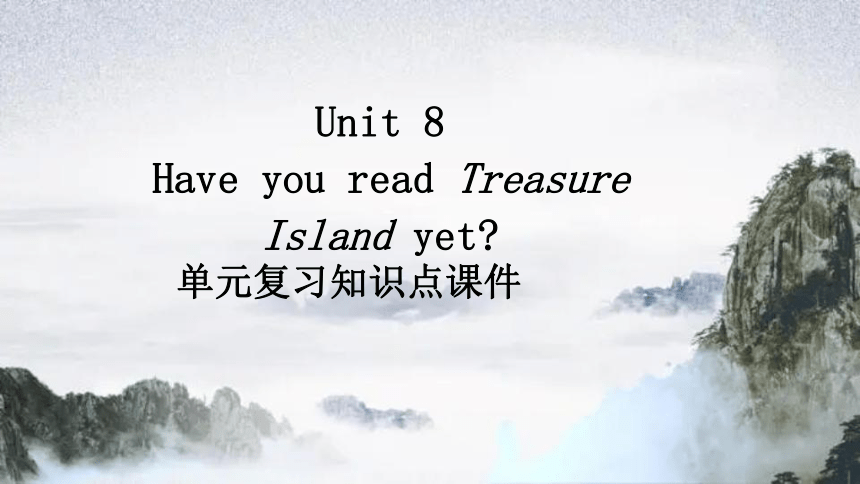 | |
| 格式 | pptx | ||
| 文件大小 | 226.4KB | ||
| 资源类型 | 教案 | ||
| 版本资源 | 人教新目标(Go for it)版 | ||
| 科目 | 英语 | ||
| 更新时间 | 2023-06-11 16:57:14 | ||
图片预览

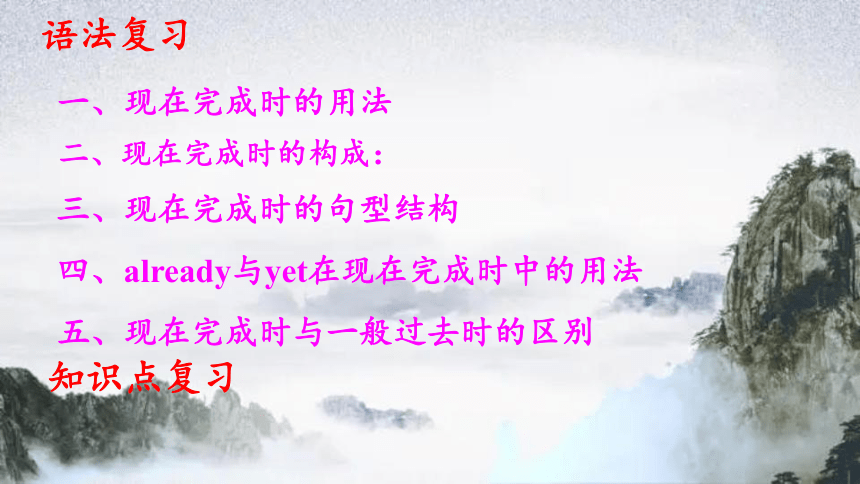
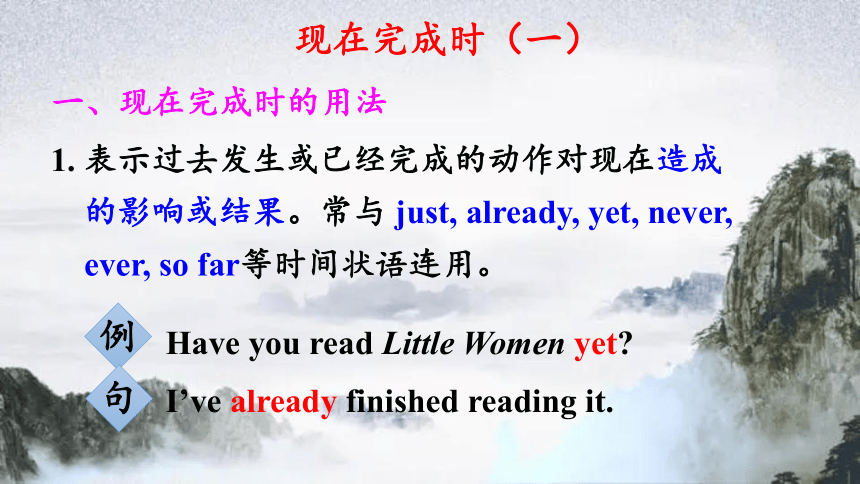
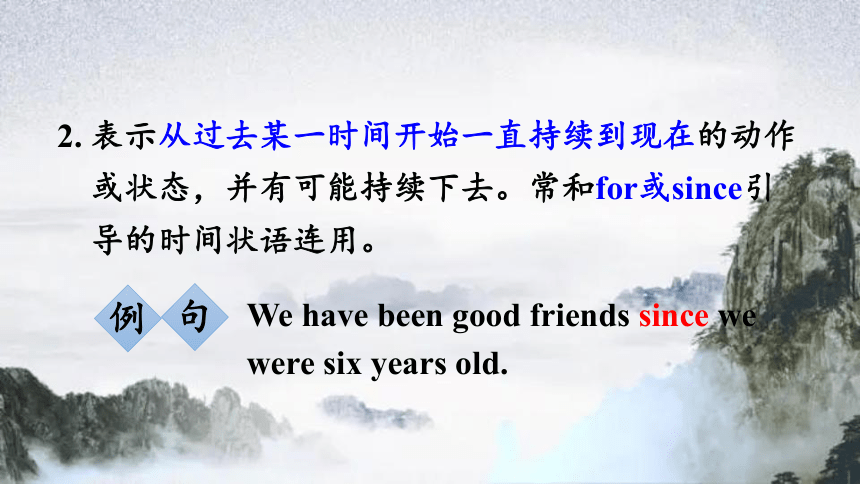
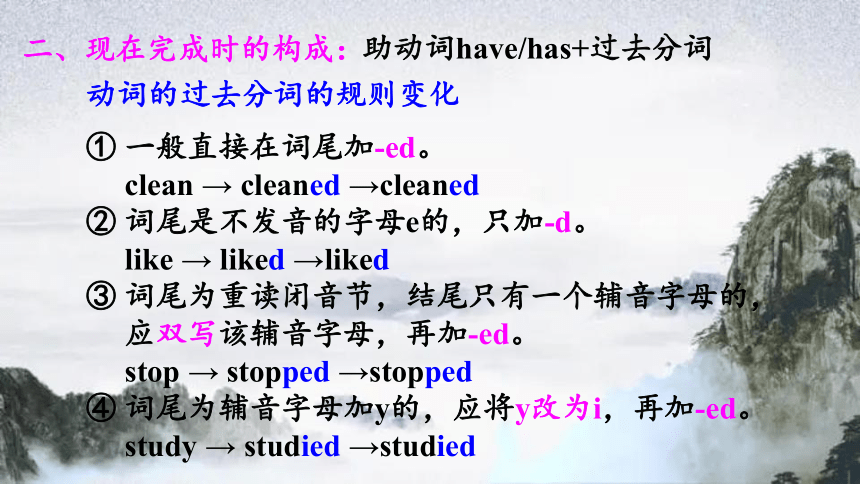
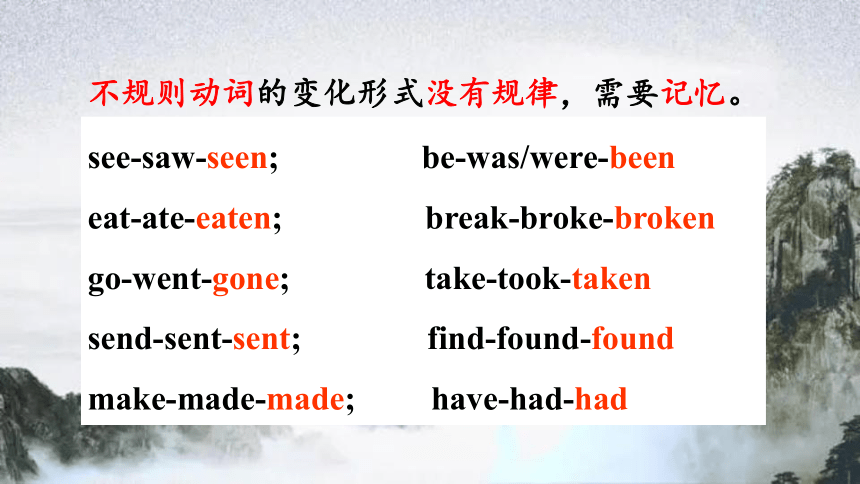
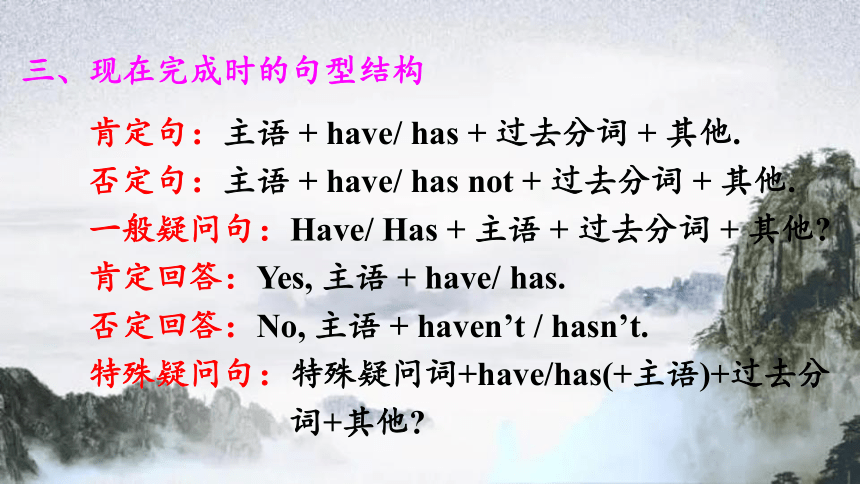
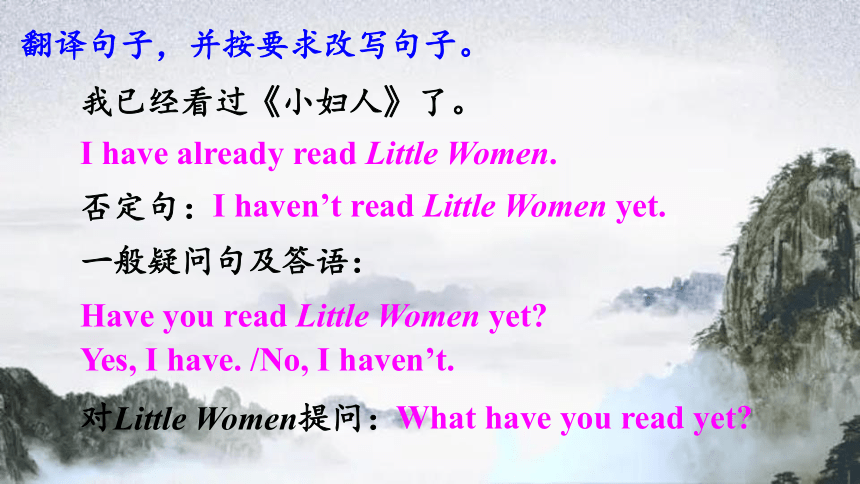
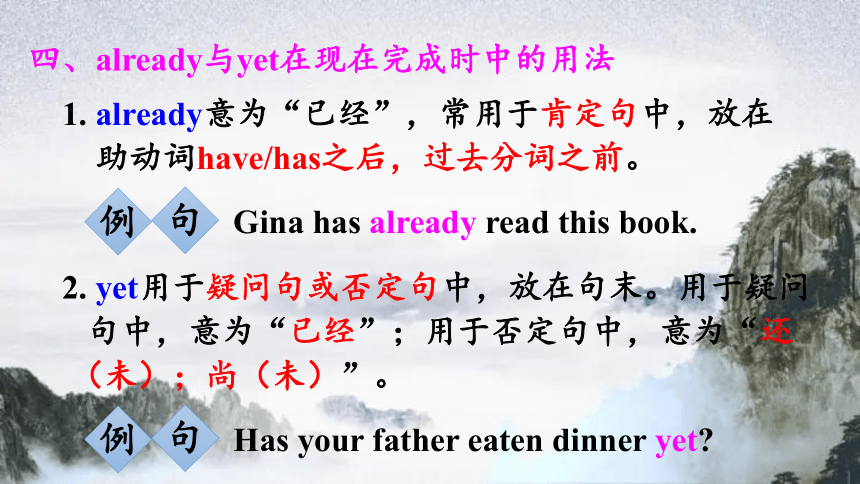
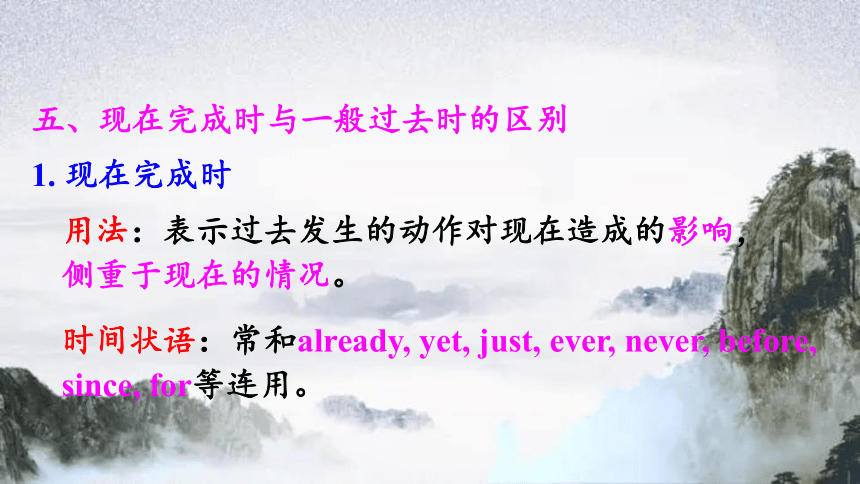

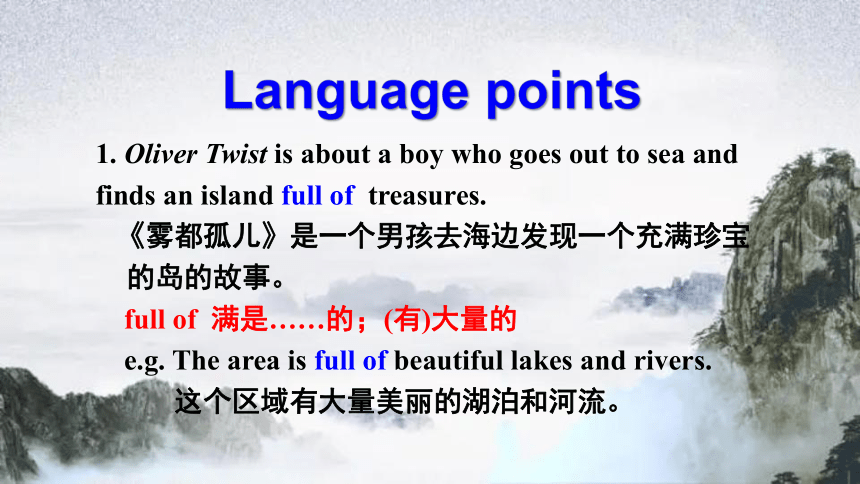
文档简介
(共34张PPT)
Unit 8
Have you read Treasure Island yet
单元复习知识点课件
语法复习
一、现在完成时的用法
二、现在完成时的构成:
三、现在完成时的句型结构
四、already与yet在现在完成时中的用法
五、现在完成时与一般过去时的区别
知识点复习
现在完成时(一)
1. 表示过去发生或已经完成的动作对现在造成
的影响或结果。常与 just, already, yet, never,
ever, so far等时间状语连用。
一、现在完成时的用法
I’ve already finished reading it.
Have you read Little Women yet
例
句
2. 表示从过去某一时间开始一直持续到现在的动作
或状态,并有可能持续下去。常和for或since引
导的时间状语连用。
We have been good friends since we
were six years old.
例
句
动词的过去分词的规则变化
① 一般直接在词尾加-ed。
clean → cleaned →cleaned
② 词尾是不发音的字母e的,只加-d。
like → liked →liked
③ 词尾为重读闭音节,结尾只有一个辅音字母的,
应双写该辅音字母,再加-ed。
stop → stopped →stopped
④ 词尾为辅音字母加y的,应将y改为i,再加-ed。
study → studied →studied
二、现在完成时的构成:
助动词have/has+过去分词
see-saw-seen; be-was/were-been
eat-ate-eaten; break-broke-broken
go-went-gone; take-took-taken
send-sent-sent; find-found-found
make-made-made; have-had-had
不规则动词的变化形式没有规律,需要记忆。
三、现在完成时的句型结构
肯定句:主语 + have/ has + 过去分词 + 其他.
否定句:主语 + have/ has not + 过去分词 + 其他.
一般疑问句:Have/ Has + 主语 + 过去分词 + 其他
肯定回答:Yes, 主语 + have/ has.
否定回答:No, 主语 + haven’t / hasn’t.
特殊疑问句:特殊疑问词+have/has(+主语)+过去分
词+其他
我已经看过《小妇人》了。
I have already read Little Women.
否定句:
I haven’t read Little Women yet.
一般疑问句及答语:
Have you read Little Women yet
Yes, I have. /No, I haven’t.
对Little Women提问:
What have you read yet
翻译句子,并按要求改写句子。
四、already与yet在现在完成时中的用法
1. already意为“已经”,常用于肯定句中,放在
助动词have/has之后,过去分词之前。
2. yet用于疑问句或否定句中,放在句末。用于疑问
句中,意为“已经”;用于否定句中,意为“还
(未);尚(未)”。
Gina has already read this book.
例
句
Has your father eaten dinner yet
例
句
五、现在完成时与一般过去时的区别
1. 现在完成时
用法:表示过去发生的动作对现在造成的影响,
侧重于现在的情况。
时间状语:常和already, yet, just, ever, never, before,
since, for等连用。
2. 一般过去时
用法:表示过去某个时间发生的动作或存在的状态,与现在无关。
时间状语:常和yesterday, last week, just now, in 2012, two days ago等具体的表示过去的时间状语连用。
1. Oliver Twist is about a boy who goes out to sea and finds an island full of treasures.
《雾都孤儿》是一个男孩去海边发现一个充满珍宝的岛的故事。
full of 满是……的;(有)大量的
e.g. The area is full of beautiful lakes and rivers.
这个区域有大量美丽的湖泊和河流。
Language points
2. Have you at least read the back of the book to see what it’s about
至少你已经读过书的后面,了解了它的大致内容吧?
此句中的动词see表示“(通过查看、打听等)弄清、了解;查看、发现(信息或事实)”。作这种用法时,see常接how, what, when等引导的宾语从句。
e.g. He agreed to go with me to see what was wrong.
他同意跟我去了解一下毛病出在哪里。
First of all, we need to take some time to see how it works.
首先,我们需要花些时间了解一下它是如何运作的。
3. You should hurry up. 你需要加快速度。
hurry up 赶快;(急忙)做某事
Hurry up, or we cannot get to the railway station on time.
快些,否则我们不能按时赶到火车站了。
4. Steve: …The book report is due in two weeks.
Amy: Yes, I know… 是的,我知道…
1) due adj. 预定;预期;预计
后边引出预期的时间、地点等,还常常构成短语be
due (to do something)或be due (for something)。
e.g. Our plane is due at Shanghai Hongqiao
International Airport at 12:30.
我们的飞机预计于12:30降落在上海虹桥国际机场。
Rose is due to start school in January.
罗丝一月份就要开始上学了。
2) I know表示说话人对所谈的观点、内容已了解,无需多说,相当于汉语中“我早知道了;我全都了解”这样的意思,区别于许多日常交际场合中表示“我明白了;我知道了;我懂了”的用法。
5. Although I have lost everything, I have not lost my life.
虽然我失去了一切,但是没有失去生命。
although“虽然,尽管”,引导让步状语从句,不能与but连用。
e.g. Although he is young, he works hard.
= He is young, but he works hard.
尽管他年龄小,但是工作很努力。
6. So I will not give up and I will wait for another ship.
因此我不放弃,要等候另一只船。
another 既可用作形容词,也可用作代词。用作形容词时,意思是“又一的;再一的”,修饰名词,位于名词前;用作代词时,意思是“另一个”。
e.g. Another man came in at that time.
Saying is one thing and doing is another.
another还可和数词连用,常在数词前面,意为“还;再”,等同于数词+more。
e.g.
We need another three teachers to help the boys.
We need three more teachers to help the boys.
我们还需要另外三个老师来帮这些男孩子们。
7. How long have they been here
他们来这儿多久了?
how long 常用于询问时间,意为“多久;多长时间”,与现在完成时连用,要求谓语动词必须是延续性动词。
e.g. How long have you had the book
你买这本书多久了?
4. Not long after that, I saw some cannibals trying to kill two men from a broken ship.
那之后不久,我看见一些食人肉者在试图杀死两个来自破船上的人。
see sb. doing sth.意为“看到某人正在做某事”,强调看到的动作正在进行。
e.g. Mary saw him cleaning the classroom. 玛丽看见他正在打扫教室。
see sb. do sth.意为“看到某人做了某事”,强调看到某人做一件事的全过程。
e.g.
① 昨天我看见她正在花园里干活。
I saw her working in the garden yesterday.
② 昨天我看见她在花园里干活了。
I saw her work in the garden yesterday.
5. One of them died, but the other ran
towards my house.
他们当中一个人死了,但是另一个朝我
的房子跑来。
run towards 朝……跑
e.g.
He ran towards the station.
他朝车站跑去。
6. I named him Friday because that was the
day I met him.
我管他叫星期五,因为那是我遇见他的那
一天。
name作动词,意为“命名;给……取名”
e.g.
Lucy named her little son David.
露西给她的小儿子取名为戴维。
8.When Sarah was a teenager, she used to fight
over almost everything with her family.
used to “过去常常”,后跟动词原形
e.g. She used to sing this song, but now she doesn’t.
她过去经常唱这首歌,但是现在不唱了。
9. Ever since then, she has been a fan of
American country music.
ever since then “从那时以来”,与现在完
成时连用,要求动词必须是延续性动词。
e.g. Ever since then, I have lived here.
从那时以来, 我就住在这儿。
3. Many songs these days are just about modern life in the US, such as …, but not about belonging to a group.
belong to可以表示“属于(某人)”或“属于(某团体或组织)”等。
这钢笔是我父亲的。
The pen belongs to my father.
他是吉他俱乐部的成员。
He belongs to the guitar club.
10. Country music brings us back to the “good old days” when people were kind to each other and trusted one another.
each other与one another均可表示“相互”。
我和露西相识好多年了。
Lucy and I have known one another for years.
女孩们互相看了看。
The girls looked at each other.
11. It reminds us that the best thing in life
is free….
reminds sb. that+从句 “使某人想起某事”
e.g. This book reminds me that I should
study hard.
这本书提醒我应该努力学习。
12. Sarah hasn’t been to Nashville yet, but
it is her dream to go there one day.
It is one’s dream to + do sth.
“做某事是某人的梦想”
e.g. It is my dream to go to America.
去美国是我的梦想。
7. I hope to see him sing live one day!
1) see sb. do sth. 表示“看见某人做某事”。类似
的感官动词还有:watch, feel, hear, smell 等用于
主动语态时,后面可以接名词(或代词)+ 不带
to 的不定式(或v-ing形式)。
see sb. do sth. 意为“看到某人做了某事”,强
调看到动作的全过程。而see sb. doing sth.意
为“看到某人正在做某事”,强调看到的动正
在进行。
e.g. Mary saw him clean the classroom.
玛丽看见他打扫教室了。
Mary saw him cleaning the classroom.
玛丽看见他正在打扫教室。
2) live adv. 意为“在现场直播;在现场表演”。
e.g. LangLang is playing live in our city
tonight.
朗朗今晚在我们城市举办现场演奏。
13. He’s sold more than 120 million records.
million与thousand,hundred用法一样:
与具体数词连用时,用单数形式,后面不加-s
与of连用表示约数时,后面必须加-s,且不
与数词连用。
去年我们种了两百万棵树。
Last year we planted two million trees.
上百万人都在电视上观看了这场比赛。
Millions of people watched the match on TV.
1. Review the words and phrases
2. Write an article about your
favorite singer or writer, use
the useful phrases in 3b.
Homework
Unit 8
Have you read Treasure Island yet
单元复习知识点课件
语法复习
一、现在完成时的用法
二、现在完成时的构成:
三、现在完成时的句型结构
四、already与yet在现在完成时中的用法
五、现在完成时与一般过去时的区别
知识点复习
现在完成时(一)
1. 表示过去发生或已经完成的动作对现在造成
的影响或结果。常与 just, already, yet, never,
ever, so far等时间状语连用。
一、现在完成时的用法
I’ve already finished reading it.
Have you read Little Women yet
例
句
2. 表示从过去某一时间开始一直持续到现在的动作
或状态,并有可能持续下去。常和for或since引
导的时间状语连用。
We have been good friends since we
were six years old.
例
句
动词的过去分词的规则变化
① 一般直接在词尾加-ed。
clean → cleaned →cleaned
② 词尾是不发音的字母e的,只加-d。
like → liked →liked
③ 词尾为重读闭音节,结尾只有一个辅音字母的,
应双写该辅音字母,再加-ed。
stop → stopped →stopped
④ 词尾为辅音字母加y的,应将y改为i,再加-ed。
study → studied →studied
二、现在完成时的构成:
助动词have/has+过去分词
see-saw-seen; be-was/were-been
eat-ate-eaten; break-broke-broken
go-went-gone; take-took-taken
send-sent-sent; find-found-found
make-made-made; have-had-had
不规则动词的变化形式没有规律,需要记忆。
三、现在完成时的句型结构
肯定句:主语 + have/ has + 过去分词 + 其他.
否定句:主语 + have/ has not + 过去分词 + 其他.
一般疑问句:Have/ Has + 主语 + 过去分词 + 其他
肯定回答:Yes, 主语 + have/ has.
否定回答:No, 主语 + haven’t / hasn’t.
特殊疑问句:特殊疑问词+have/has(+主语)+过去分
词+其他
我已经看过《小妇人》了。
I have already read Little Women.
否定句:
I haven’t read Little Women yet.
一般疑问句及答语:
Have you read Little Women yet
Yes, I have. /No, I haven’t.
对Little Women提问:
What have you read yet
翻译句子,并按要求改写句子。
四、already与yet在现在完成时中的用法
1. already意为“已经”,常用于肯定句中,放在
助动词have/has之后,过去分词之前。
2. yet用于疑问句或否定句中,放在句末。用于疑问
句中,意为“已经”;用于否定句中,意为“还
(未);尚(未)”。
Gina has already read this book.
例
句
Has your father eaten dinner yet
例
句
五、现在完成时与一般过去时的区别
1. 现在完成时
用法:表示过去发生的动作对现在造成的影响,
侧重于现在的情况。
时间状语:常和already, yet, just, ever, never, before,
since, for等连用。
2. 一般过去时
用法:表示过去某个时间发生的动作或存在的状态,与现在无关。
时间状语:常和yesterday, last week, just now, in 2012, two days ago等具体的表示过去的时间状语连用。
1. Oliver Twist is about a boy who goes out to sea and finds an island full of treasures.
《雾都孤儿》是一个男孩去海边发现一个充满珍宝的岛的故事。
full of 满是……的;(有)大量的
e.g. The area is full of beautiful lakes and rivers.
这个区域有大量美丽的湖泊和河流。
Language points
2. Have you at least read the back of the book to see what it’s about
至少你已经读过书的后面,了解了它的大致内容吧?
此句中的动词see表示“(通过查看、打听等)弄清、了解;查看、发现(信息或事实)”。作这种用法时,see常接how, what, when等引导的宾语从句。
e.g. He agreed to go with me to see what was wrong.
他同意跟我去了解一下毛病出在哪里。
First of all, we need to take some time to see how it works.
首先,我们需要花些时间了解一下它是如何运作的。
3. You should hurry up. 你需要加快速度。
hurry up 赶快;(急忙)做某事
Hurry up, or we cannot get to the railway station on time.
快些,否则我们不能按时赶到火车站了。
4. Steve: …The book report is due in two weeks.
Amy: Yes, I know… 是的,我知道…
1) due adj. 预定;预期;预计
后边引出预期的时间、地点等,还常常构成短语be
due (to do something)或be due (for something)。
e.g. Our plane is due at Shanghai Hongqiao
International Airport at 12:30.
我们的飞机预计于12:30降落在上海虹桥国际机场。
Rose is due to start school in January.
罗丝一月份就要开始上学了。
2) I know表示说话人对所谈的观点、内容已了解,无需多说,相当于汉语中“我早知道了;我全都了解”这样的意思,区别于许多日常交际场合中表示“我明白了;我知道了;我懂了”的用法。
5. Although I have lost everything, I have not lost my life.
虽然我失去了一切,但是没有失去生命。
although“虽然,尽管”,引导让步状语从句,不能与but连用。
e.g. Although he is young, he works hard.
= He is young, but he works hard.
尽管他年龄小,但是工作很努力。
6. So I will not give up and I will wait for another ship.
因此我不放弃,要等候另一只船。
another 既可用作形容词,也可用作代词。用作形容词时,意思是“又一的;再一的”,修饰名词,位于名词前;用作代词时,意思是“另一个”。
e.g. Another man came in at that time.
Saying is one thing and doing is another.
another还可和数词连用,常在数词前面,意为“还;再”,等同于数词+more。
e.g.
We need another three teachers to help the boys.
We need three more teachers to help the boys.
我们还需要另外三个老师来帮这些男孩子们。
7. How long have they been here
他们来这儿多久了?
how long 常用于询问时间,意为“多久;多长时间”,与现在完成时连用,要求谓语动词必须是延续性动词。
e.g. How long have you had the book
你买这本书多久了?
4. Not long after that, I saw some cannibals trying to kill two men from a broken ship.
那之后不久,我看见一些食人肉者在试图杀死两个来自破船上的人。
see sb. doing sth.意为“看到某人正在做某事”,强调看到的动作正在进行。
e.g. Mary saw him cleaning the classroom. 玛丽看见他正在打扫教室。
see sb. do sth.意为“看到某人做了某事”,强调看到某人做一件事的全过程。
e.g.
① 昨天我看见她正在花园里干活。
I saw her working in the garden yesterday.
② 昨天我看见她在花园里干活了。
I saw her work in the garden yesterday.
5. One of them died, but the other ran
towards my house.
他们当中一个人死了,但是另一个朝我
的房子跑来。
run towards 朝……跑
e.g.
He ran towards the station.
他朝车站跑去。
6. I named him Friday because that was the
day I met him.
我管他叫星期五,因为那是我遇见他的那
一天。
name作动词,意为“命名;给……取名”
e.g.
Lucy named her little son David.
露西给她的小儿子取名为戴维。
8.When Sarah was a teenager, she used to fight
over almost everything with her family.
used to “过去常常”,后跟动词原形
e.g. She used to sing this song, but now she doesn’t.
她过去经常唱这首歌,但是现在不唱了。
9. Ever since then, she has been a fan of
American country music.
ever since then “从那时以来”,与现在完
成时连用,要求动词必须是延续性动词。
e.g. Ever since then, I have lived here.
从那时以来, 我就住在这儿。
3. Many songs these days are just about modern life in the US, such as …, but not about belonging to a group.
belong to可以表示“属于(某人)”或“属于(某团体或组织)”等。
这钢笔是我父亲的。
The pen belongs to my father.
他是吉他俱乐部的成员。
He belongs to the guitar club.
10. Country music brings us back to the “good old days” when people were kind to each other and trusted one another.
each other与one another均可表示“相互”。
我和露西相识好多年了。
Lucy and I have known one another for years.
女孩们互相看了看。
The girls looked at each other.
11. It reminds us that the best thing in life
is free….
reminds sb. that+从句 “使某人想起某事”
e.g. This book reminds me that I should
study hard.
这本书提醒我应该努力学习。
12. Sarah hasn’t been to Nashville yet, but
it is her dream to go there one day.
It is one’s dream to + do sth.
“做某事是某人的梦想”
e.g. It is my dream to go to America.
去美国是我的梦想。
7. I hope to see him sing live one day!
1) see sb. do sth. 表示“看见某人做某事”。类似
的感官动词还有:watch, feel, hear, smell 等用于
主动语态时,后面可以接名词(或代词)+ 不带
to 的不定式(或v-ing形式)。
see sb. do sth. 意为“看到某人做了某事”,强
调看到动作的全过程。而see sb. doing sth.意
为“看到某人正在做某事”,强调看到的动正
在进行。
e.g. Mary saw him clean the classroom.
玛丽看见他打扫教室了。
Mary saw him cleaning the classroom.
玛丽看见他正在打扫教室。
2) live adv. 意为“在现场直播;在现场表演”。
e.g. LangLang is playing live in our city
tonight.
朗朗今晚在我们城市举办现场演奏。
13. He’s sold more than 120 million records.
million与thousand,hundred用法一样:
与具体数词连用时,用单数形式,后面不加-s
与of连用表示约数时,后面必须加-s,且不
与数词连用。
去年我们种了两百万棵树。
Last year we planted two million trees.
上百万人都在电视上观看了这场比赛。
Millions of people watched the match on TV.
1. Review the words and phrases
2. Write an article about your
favorite singer or writer, use
the useful phrases in 3b.
Homework
同课章节目录
- Unit 1 What's the matter?
- Section A
- Section B
- Unit 2 I'll help to clean up the city parks.
- Section A
- Section B
- Unit 3 Could you please clean your room?
- Section A
- Section B
- Unit 4 Why don't you talk to your parents?
- Section A
- Section B
- Unit 5 What were you doing when the rainstorm came
- Section A
- Section B
- Review of Units 1-5
- Unit 6 An old man tried to move the mountains.
- Section A
- Section B
- Unit 7 What's the highest mountain in the world?
- Section A
- Section B
- Unit 8 Have you read Treasure Island yet?
- Section A
- Section B
- Unit 9 Have you ever been to a museum?
- Section A
- Section B
- Unit 10 I've had this bike for three years.
- Section A
- Section B
